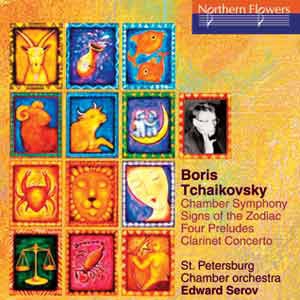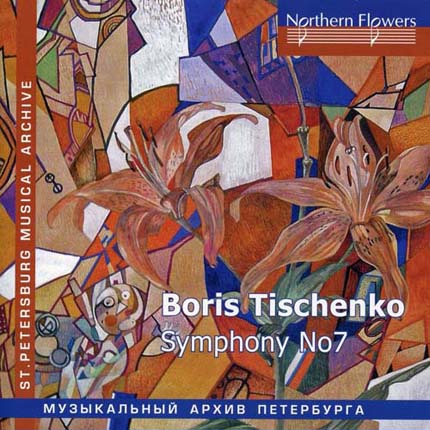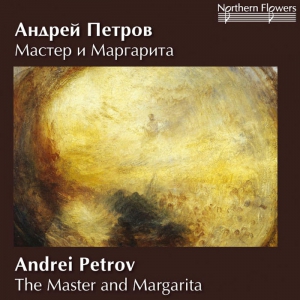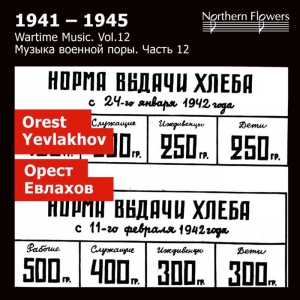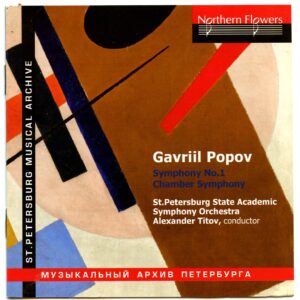Description
Boris Alexandrovich Tchaikovsky (1925 – 1996)
St. Petersburg Chamber orchestra
Edward Serov, conductor
Margarita Miroshnikova, soprano
Grigory Korchmar, cembalo
Adil Feodorov, clarinet
| Chamber Symphony (1967) |
|
|
| 1. | Sonata |
|
| 2. | Unison |
|
| 3. | Choral Music |
|
| 4. | Interlude |
|
| 5. | March Tunes |
|
| 6. | Serenade |
|
| Signs Of The Zodiac (1974), Cantata for soprano, cembalo and string orchestra | ||
| 7. | Prelude |
|
| 8. | Silentium! (Silence!).Words by F. Tyutchev |
|
| 9. | Far Out. Words by A. Blok |
|
| 10. | Cross O’ Four Road. Words by M. Tsvetaeva |
|
| 11. | Signs Of The Zodiac. Words by N. Zabolotsky |
|
| Four Preludes for chamber orchestra (1984) | ||
| 12. | Agitato. Declamando. Sostenuto. Risoluto |
|
| 13. | 13. Con moto |
|
| 14. | Adagio |
|
| 15. | Semplice |
|
| Concerto for clarinet and chamber orchestra (1957) | ||
| 16. | Moderato |
|
| 17. | Vivace |
|
| 18. | Allegro |
|
| Recorded at the Capella Concert Hall in 1985 (1 – 6; 12 – 18) and in 1986 (7 – 11) Sound recording & supervision: Gerkhard Tzes (7 – 11) and Feliks Gurdzhi. Digital mastering (2003): Victor Dinov Text: Northern Flowers English text: Sergey Suslov Design: Oleg Fakhrutdinov & Anastasia Evmenova |
||
|
We say that works of Boris Tchaikovsky are among the most notable phenomena in the 20th century Russian music; that he created his inimitable musical language organically matching classical heritage and up-to-date technique elements; that he was a virtuoso and expert in orchestration; that his best works are perfect in form and deep in content; that his refined, poetical music inspired with high ethical ideas was always free both of official ideology and volatile fashion; that it was Man, with all of his inner feelings, that always was in the focus of the composer.
All the above is true. But certain inimitable human, and composer’ s, qualities of Boris Tchaikovsky set him among a special selection of artists. He was endowed with a remarkable, generous, and really inexhaustible musical talent — and a whole-hearted, abundant, organic, and noble character. With his great heart, he could feel the acute artistic problems of his time, human sorrow and joy, subtlest feelings of an individual facing complicated collisions of life — and therefore he could speak out the essence of the surrounding world in a deep and sincere way. It is probably this facet of his music that attracts and fascinates us so strongly, and makes us revert to his compositions again and again.
Boris Alexandrovich Tchaikovsky (1925 – 1996) was born in Moscow into a white– collar family: his father was an expert in statistics and economic geography, and his mother was a medic. The parents were talented individuals who worked very efficiently, knew literature and art well, and passionately loved music. The ethical principles inherited from the parents became his lifelong inner core. Boris Tchaikovsky finished school, and the Gnessin College, and entered Moscow Conservatoire in 1941, but his studies were interrupted by the war, to be resumed only in 1944. His teachers at the Conservatoire were the prominent Vissarion Shebalin, Nikolai Myaskovsky, and Dmitry Shostakovich (Composition), and Lev Oborin (Piano.) The composer’s heritage of Boris Tchaikovsky is vast and comprehensive, comprising four symphonies, a Symphoniette, a Chamber Symphony, concertos for clarinet, cello, violin, and piano with orchestra, six string quartets, numerous chamber compositions, vocal cycles, and music to more than 30 motion pictures.
In the Chamber Symphony (1967) the author is based on the musical genres of the past, which shows in the very names of the movements. Each movement bears a clear original constructive idea. The musical development of the symphony is very logical: from a stable, eternal, but also fragile image of the universe (Sonata) via refined flexibility and statics of Unison, Choral Music, and Interlude to the vigorous March Tunes and the to final Serenade, so harmonious and reconciling. Music of Boris Tchaikovsky is generally lyrical, meaningful, and clear in style; these features are directly pronounced in the Chamber Symphony.
Signs Of The Zodiac, cantata for soprano, chamber orchestra, and harpsichord, is permeated with thrilling dramatic impact and passionate expressiveness. The selection of poetry for the cantata is striking, for it is hard to set in a row poets that would be more unlike, and to combine moods and images so differing. On the other hand, all the four poems represent the best pages of Russian lyrical poetry. The highest quality of the literature was a source of inspiration for the composer, while its strangeness and contrast enabled Boris Tchaikovsky to create a really integral opus where Music and Word co–exist in inseparable, mutually enriching fusion.
In the orchestra Prelude, the composer exposes the main components of the cantata’s musical material; he tunes the listener to a certain range of images and attitudes. Silentium! (Silence!) by Fyodor Tyutchev selected as the base for the second part is a landmark poem in Russian literature. It is eighteen lines about the intrinsic value of human inner world, about its loneliness, and impossibility to penetrate and understand human soul with any completeness. The orchestration of this part is very troubled, and the vocal tune is dynamic and expressive, its nature quite fitting with the imperative tone of the poem.
The third part, Far Out to words by Alexander Blok (Blok’s title of the poem is “We’ll Be Buried Deep In The Earth”), is transparent and fragile, it lulls and calms you in a steady dispassionate motion. Boris Tchaikovsky emphasizes the bright sorrow and charming musicality of Blok’s words. The culmination of the Cantata is its fourth part, Cross O’ Four Roads by Marina Tsvetaeva. The broad range and excited advance of the melody, enormous amplitude of sound from pianissimo to fortissimo, and diversity of complex alternating measures (to suit Tsvetaeya’ line “I don’t trust poetry that flows, I trust it when it bursts”) produce striking and impressive musical action. Reaching the apex with the utmost stress and piercing pain, the motion freezes; the shout is reduced to begging, and despair, to resignation.
In the final part, Signs Of The Zodiac to words by Nikolai Zabolotsky, a very favorite poet of Boris Tchaikovsky, we find a sharp and sudden contrast to the preceding parts. It bears no drama, no sadness, and no contemplation. Crisp chords of harpsichord, high flageolet sounds of violins, a very simple tune reminding a naive childish song, and a surprising, whimsical, mysterious, and a bit mocking poem of young Zabolotsky (dated 1929, the time of ‘negation’ of classical, Pushkinian first of all, traditions of Russian poetry.) The phantasm of night visions, a bit funny and a bit frightening, the comical and delirious dreams of a tired mind let you forget death, and pain, and calamities of life just for a while.
In 1965, Boris Tchaikovsky addressed the lyrics of Joseph Brodsky to create a vocal cycle titled Four Poems of J. Brodsky for voice and piano. This composition had to be kept in the composer’s desk completely unknown for 23 years; it was a rather daring act in the Soviet Union of those days to pronounce aloud the name of that Noble Prize winner, that émigré to the West, let alone public recitals. No hope left for restoration of the banned poet’s good name, the composer re-arranged the vocal cycle for orchestra, and titled the version “Four Preludes for Chamber Orchestra” .
In this opus, the author ponders over various impressions of life in their dramatic development, presenting them in understandable and clear forms. The reciting attitude of the opening Agitato, nervous pulsation in Con moto, ultimate emotional stresses in the third prelude, Adagio, and a moment of bright joy, impulse, and anticipation of the future so typical for Boris Tchaikovsky, in the final piece Semplice (it is noteworthy that the finale of the vocal cycle is named Stanzas, its words being one of the most thrilling poems of Joseph Brodsky, I don’t want to choose / Neither country nor graveyard / It’s Vasilievsky Island / Where I’ll come back to die.) Such was the ‘construction material’ of this outstanding opus with a complicated background.
Concerto for clarinet and orchestra (1957) is an earlier composition of Boris Tchaikovsky. Its three movements following without any break are built into an integral, whole, and harmonious composition. The first movement, melodious and elegiac, is superseded by the virtuoso–laden second, while the finale, the longest and most developed in the concerto, is marked with contrasting themes and dramatic strain.
Fyodor Tyutchev. Silentium! (Silence!) Know how to live inside yourself —
Alexander Blok. Far Out It’s so cozy here, we never hurry; Marina Tsvetaeva. Cross O’ Four Roads Why, I never avoided Quite a few of you friends Nikolai Zabolotsky. Signs Of The Zodiac You graduate of ages gone, The earth’s abode is tall and lofty. The rattle’s going tap, tap, tap, |

